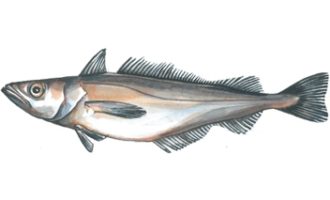Boil hake fish fillet pieces are placed in a pot of boiling water and boiled for 30 minutes over low heat under a lid. Cook hake in a double boiler for 40 minutes . In a slow cooker, cook hake on the “Steaming” mode for 20 minutes . The whole fish is not boiled because, as a rule, it is too large.
Recipe for boiled hake with spices
Hake fillet – half a kilo Cucumber pickle – 1 cup Water – 1 cup Butter – 30 grams Green onion, garlic, dill, parsley, black pepper – to taste.
How delicious to cook hake Pour cucumber brine and water into a saucepan, bring to a boil, put pieces of hake skin side up, spices, and cook for 30 minutes. Serve boiled hake with butter.
Polish sauce for boiled hake
Products Broth – one and a half cups Flour – 2 tablespoons Sunflower or olive oil – 1 tablespoon Chicken egg – 1 piece Butter – half a tablespoon Lemon juice from half a lemon Salt – to taste How to prepare hake sauce 1. Boil a chicken egg, finely cut. 2. Melt the butter in a frying pan, put the flour, fry, stirring. 3. Dilute hake broth. 4. Add the egg, herbs and seasonings, pour in the lemon juice, salt and cook without a lid for 10 minutes. Serve the sauce separately from the hake.
Tasty Facts
– Hake calorie content – 86 kcal / 100 grams. – The cost of a frozen hake is 200-300 rubles / 1 kilogram (on average in Moscow as of June 2020). To choose a hake in a store, you need to dry freeze (otherwise there is a chance to pay for ice at the price of a hake), the fillet must be whole (otherwise there is a high risk of re-freezing), no more than 30 centimeters long, the amount of glaze should not exceed 5%. – Hake season – in February-March, then the cost of this fish is significantly reduced. – Another name for hake is hake. – Fry the hake for 7 minutes on each side over medium heat without a lid. – Shelf life of boiled hake– 3 days in the refrigerator. – There are few bones in fish, hake is considered a low-calorie product of a fairly low cost, so hake is very common in cooking. – Hake is very useful for the content of vitamins PP (growth, skin and bone health, maintaining a normal digestive tract), vitamin B9 (growth and development of new cells), vitamin A (normalization of metabolism and immune system), iodine (normal functioning of the nervous system and thyroid glands) and copper (health of the bone and circulatory systems).
